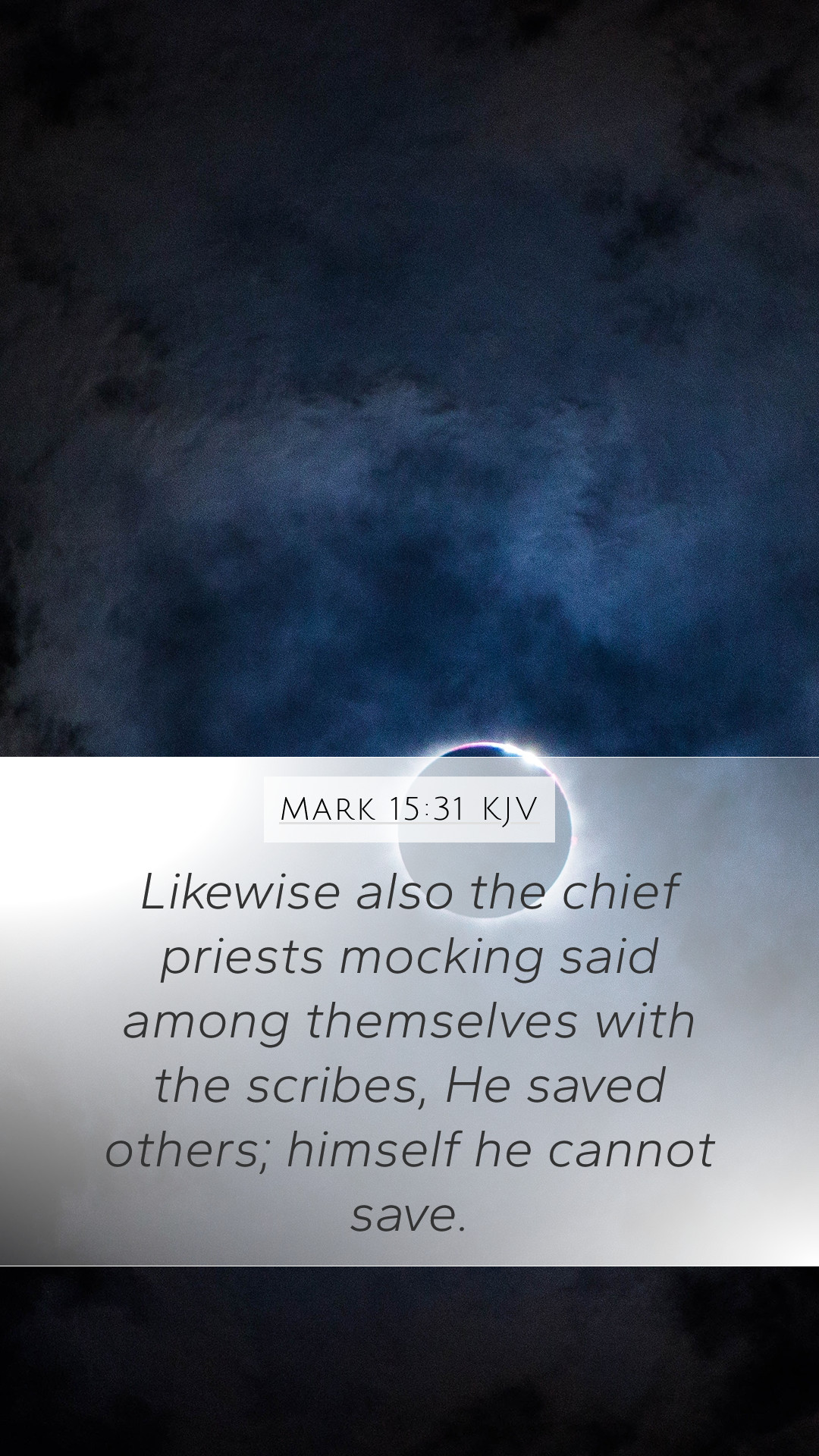Bible Verse Explanation: Mark 15:31
Verse: "Likewise also the chief priests mocking said among themselves with the scribes, He saved others; himself he cannot save." (Mark 15:31)
Overview of the Verse
Mark 15:31 captures a poignant moment during the crucifixion of Jesus, highlighting the mockery and scorn directed towards Him by the religious leaders of the time. This verse serves as an indictment of the leaders’ hardened hearts and demonstrates their inability to recognize the truth of Jesus’s mission and His divine authority.
Contextual Background
To fully understand the implications of Mark 15:31, it is essential to consider the historical and cultural context surrounding the events of the crucifixion. The religious leaders, including the chief priests and scribes, were threatened by Jesus’s growing influence and were determined to undermine His authority. Their mockery not only reflects their disdain but also reveals their misunderstanding of Jesus’s role as the Messiah.
Bible Verse Meanings and Interpretations
-
Matthew Henry's Commentary:
Matthew Henry emphasizes the hypocrisy of the chief priests. Their mocking remarks highlight a profound irony; while they acknowledge Jesus’s power to save others, they fail to comprehend His purpose was not to save Himself from death but to willingly sacrifice His life for humanity. Henry points out that this moment illustrates the ultimate rejection of Jesus's redemptive mission.
-
Albert Barnes' Notes:
Barnes further elaborates that the religious leaders’ challenge encapsulates a significant theological concept. They assumed that if Jesus had the power to save others, He should exercise that power to rescue Himself. This reflects a misunderstanding of Christ’s mission, which involved suffering and death as necessary for salvation. Barnes stresses the importance of understanding that Jesus’s silence and restraint in the face of mockery were part of His prophetic fulfillment.
-
Adam Clarke's Commentary:
Clarke’s analysis focuses on the characteristics of mockery and pride embodied by the religious leaders. He interprets their disdain as a sign of spiritual blindness, illustrating their failure to recognize the significance of the crucifixion event. Clarke also touches upon the fact that these accusations fulfilled Old Testament prophecy regarding the Messiah’s rejection, noting the connection to Psalm 22, where Christ is depicted as a suffering servant.
In-depth Analysis of the Message
Mark 15:31 serves not only as a record of historical events but also as a profound spiritual lesson for readers today. The mockery of the chief priests fosters an understanding of the spiritual warfare that often occurs in the face of divine revelation. This moment calls for self-reflection on how sometimes, mockery and skepticism can surface in our own lives when we confront truths that challenge our perspectives.
Additionally, the verse highlights a critical aspect of Jesus's mission: the suffering servant motif. Instead of saving Himself, Jesus allowed His sacrificial death to pave the way for the salvation of many, which serves as a model for Christian humility and selflessness. This moment underscores the importance of understanding Scripture within its narrative and theological framework.
Application of the Verse
The mockery faced by Jesus in Mark 15:31 serves as a reminder for believers about the realities of faith and persecution. As Christians face ridicule or doubt in their beliefs, this verse encourages standing firm in faith despite external criticism. It invites reflection on how to embody humility and grace amid skepticism and highlights the necessity of relying on God’s strength rather than human approval.
Moreover, this verse can provoke discussion in Bible study groups about the nature of true strength and faith, challenging us to consider the ways in which we can support one another in our faith journeys.
Related Bible Verses for Cross-Reference
- Psalm 22:7-8 - "All who see me mock me; they hurl insults, shaking their heads." (Foreshadowing Jesus's suffering and mockery)
- Isaiah 53:3 - "He was despised and rejected by mankind, a man of suffering, and familiar with pain." (Referring to Jesus’s suffering Messiah role)
- Luke 23:35 - "The rulers sneered at him and said, 'He saved others; let him save himself if he is God’s Messiah, the Chosen One.'" (A parallel account of mockery during crucifixion)
Conclusion
Mark 15:31 encapsulates the opposition Jesus faced during His crucifixion, illustrating the human tendency to mock what we do not understand. Through the lens of public domain commentaries, we gain a richer, deeper understanding of this verse's significance, not only within its biblical context but also in how it calls believers to reflect on their own faith journeys. Engaging with such verses through careful scripting and analysis enhances our Bible study insights and offers profound bible verse explanations that are relevant for daily living.


